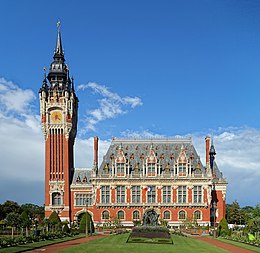Hôtel de Ville, Calais
| UNESCO World Heritage Site | |
|---|---|
 Hôtel de Ville, Calais | |
| Location | Calais, France |
| Part of | Belfries of Belgium and France |
| Criteria | Cultural: (ii), (iv) |
| Reference | 943-048 |
| Inscription | 1999 (23rd Session) |
| Extensions | 2005 |
| Area | 0.182 ha (0.45 acres) |
| Buffer zone | 700 ha (1,700 acres) |
| Coordinates | 50°57′09″N 1°51′16″E / 50.95263°N 1.85452°E |
The Hôtel de Ville (French pronunciation: [otɛl də vil], City Hall) is the seat of the city council in Calais, France. The building features a belfry of red brick and white limestone which is 72 metres (236 ft) high.
History
An ancient Hôtel de Ville, located in Old Calais, was commissioned by King Francis II, as a place where merchants could meet, in 1559.[1][2]
In 1885, Old Calais, which was centred round Église Note Dame on the north side of the Canal de Calais, merged with Saint-Pierre, which centred round Église Saint-Pierre on the south side of the Canal de Calais.[3] This led to calls for a new Hôtel de Ville to serve both districts. The site the council selected was in the area between the two towns, an area know as the "Plain dite du Sahara", because it was completely covered in sand dunes.[4]
Work on the new building stated in 1912, but was temporarily paused during the First World War. It was designed by Louis Debrouwer of Dunkirk in the Renaissance Revival and Flemish styles, built in red brick from Kortrijk, white limestone and reinforced concrete, and was completed in 1923.[5] The design involved an asymmetrical main frontage facing west onto the Place du Soldat Inconnu. The layout involved a belfry, which was 72 metres (236 ft) high, to the north of the site, a recessed connecting bay, and a main block, of seven bays, to the south of the site. The belfry was designed in the style of a flame. The main block featured a round headed doorway in the central bay. It was fenestrated by a series of round headed windows on the ground floor, by squared headed mullioned and transomed windows on the first floor and by three tall dormer windows at attic level. There were also three rows of smaller dormer windows, decreasing in size, projecting from the slate roof. The building was officially opened on 12 April 1925.[6][7]
In 2003, it was designated a monument historique by the French government,[8] and, in 2005, its belfry was added to the UNESCO World Heritage Site group of the Belfries of Belgium and France.[9]
Works of art inside the building included stained glass windows depicting the liberation of Calais by François, Duke of Guise in 1558, and a tapestry by Jeanne Thil depicting the Les bourgeois de Calais ("The Burghers of Calais"). This relates to the six leading citizens who were taken by Edward III of England after the Siege of Calais (1346–1347) during the Hundred Years' War.[10] In front of the building there is a sculpture by Auguste Rodin, also depicting the "The Burghers of Calais".[11][12][13]
References
- ^ Lennel, Fernand (1906). Calais Guide illustré du touriste à Calais et aux environs. Imprimerie Berthaud Frères. p. 11.
Le beffroi fait maintenant partie des bâtiments du vieil hôtel de ville de Calais, l'ancienne "Justice de l'Etaple" des marchands anglais, donnée en 1559 par François II aux Calaisiens.
- ^ La Grande Encyclopédie. Vol. 8. 1885. p. 840.
- ^ Cave, Nigel (1990). Battleground Europe A Guide to Battlefields in France & Flanders. Pen and Sword Books. p. 19. ISBN 978-1783832934.
- ^ "Map of Calais". Johannes Wilhelm Liebenow. Retrieved 7 October 2024.
- ^ "Louis Debrouwer, the audacious architect of Calais town hall". Daily Nord. 10 August 2015. Archived from the original on 20 October 2015. Retrieved 18 February 2022.
- ^ Fontaine, Raymond (1984). The Belle Époque in Calais. Éditions des Beffrois. p. 18. ISBN 978-2402476447.
- ^ "Hôtel de Ville de Calais". PSS Architecture. Retrieved 7 October 2024.
- ^ Base Mérimée: PA62000055, Ministère français de la Culture. (in French)
- ^ "Belfries of Belgium and France". UNESCO. Retrieved 18 February 2022.
- ^ "Hôtel de Ville et Beffroi de Calais". Compagnie du Dragon. Retrieved 8 October 2024.
- ^ Guette, Henri (23 May 2017). "Quand Rodin offre à Calais un symbole qui dérange" [When Rodin offered to Calais a symbol that caused uproar]. Beaux Arts (in French). Retrieved 18 February 2022.
- ^ "Monument to the Burghers of Calais". Musée Rodin. Retrieved 7 October 2024.
- ^ "Auguste Rodin: the Burghers of Calais" (PDF). The Metropolitan Museum of Art. Retrieved 7 October 2024.

